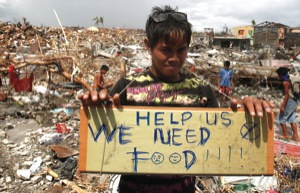
Given the recent disasters around the globe, I was reminded of my mother’s crisis of faith after the 2004 tsunami in Indonesia where more than 227,000 people lost their lives.
My mother asked fundamental questions like “Why would God kill all those people?” “They were not all evil, why were so many taken” or “Why did so many innocent children have to die?”
More recently, we only need to look to the 5,000 people lost in the Philippines or the tornadoes in the Midwest that have left so many families devastated. Of course, you can also apply the same concepts to discrimination and persecution of Jews, slavery and the challenges that many LGBT people experience within their families and beyond.
So I turned to Pastor Dan Koeshall of the Metropolitan Community Church to get answers to these questions as we approach the holiday season. Here is what he replied.
Stampp Corbin
Publisher
San Diego LGBT Weekly
Response from Pastor Dan
Stampp, thank you for the opportunity to respond to these questions. First of all, your mother is so wonderfully and beautifully human. I don’t know of anyone who has not had a crisis of faith at some time in their life. This is part of the mystery of life – these are good questions. And there are no simple answers.
I have a friend who lost three children and she told me how mad she was at God, and my response was, “I don’t blame you.” From then on, we had a connection. Even though I’m a seminary trained minister, I don’t have all the answers or pretend to have all the answers. Who can answer for God?
“Why would God kill all those people?” Simple answer: God didn’t.
I believe God created the world, and it’s not a perfect world without pain or problems. God created weather, and with that there are seasons, weather patterns and storms. Our planet is constantly changing and shifting, and with that comes earthquakes and volcanoes creating beautiful tropical islands and also tsunamis.
When disasters occur, when a loved one dies, when tragedy strikes our life, when it seems so unfair we want someone to blame. In a conversation with Rev. Alisan Rowland, she said, “There’s no simple answer to suffering. Most of us don’t like to think our suffering is meaningless, and faith in a Higher Power helps us to believe that there may be reasons for what we experience that are beyond our understanding.” I think in some circles, God gets set up for failure. God is not a cure-all. I believe in a God who is loving and compassionate and is there for us in the good times and the bad times.
Why do bad things happen to good people? Why do good things happen to bad people? Why did my beautiful mother have to suffer through a horrible fight with cancer losing her leg and eventually her life? Why wasn’t my prayer for her healing answered in the way I wanted it answered? I don’t have an answer, but I still have faith.
What is faith? Faith is a belief in things unseen. It’s hope in the midst of hopelessness. It’s an inner joy and peace that can be with you in the midst of crises. It’s the belief in something bigger than all of this. I have heard preachers say that AIDS is God’s punishment to gays for their “sin.” This is ridiculous! My mother died a painful death caused by cancer, and way too young. I didn’t blame God for taking her. Yes, it hurt, and still, I know death is part of life. So how do I respond? I honor her memory.
How do we respond when a crisis like a tsunami, typhoon, 9-11 attack or the death of a loved one happens? The first thing I do is cry and then pray. I pray because I believe in the power of positive intention. I pray to align my thinking with my Higher Power. I pray because it feels good to have compassion and want the best for others in a horrible situation. I also want to help.
In light of the recent typhoon in the Philippines, our church gathered to pray and then partnered with another church in South Bay to gather clothes, blankets and food. We collected boxes and bags and then literally laid our hands on them and prayed for them to be a blessing to others who needed them more than we did.
Disaster and sorrow bring us together. Many times it brings out the best in humanity. Look at the outpouring of love and help after Hurricane Katrina hit New Orleans. Out of tragedy rises strength and healing. Look at one mother’s response to her son getting killed by a drunk driver, the beginning of M.A.D.D. (Mothers Against Drunk Drivers). At the scene of an accident, strangers stop to help each other, sometimes at the risk of their own life.
Perhaps sorrow and tragedy can actually strengthen our faith, our faith in humanity, our faith in ourselves and our faith that we are all connected on a spiritual level – no matter how you may view God. During this season of Thanksgiving, Hanukkah, Christmas and Kwanzaa may we reach out beyond ourselves to offer hope and healing, knowing there are people in crisis or lonely or hurting and join our hearts in singing, “Let there be peace on Earth, and let it begin with me.”
REV. DAN KOESHALL,
SENIOR PASTOR
The Metropolitan Community Church
2633 Denver Street, San Diego











